初中英语八种时态解析及练习
初中八种英语时态精讲精练(含答案)
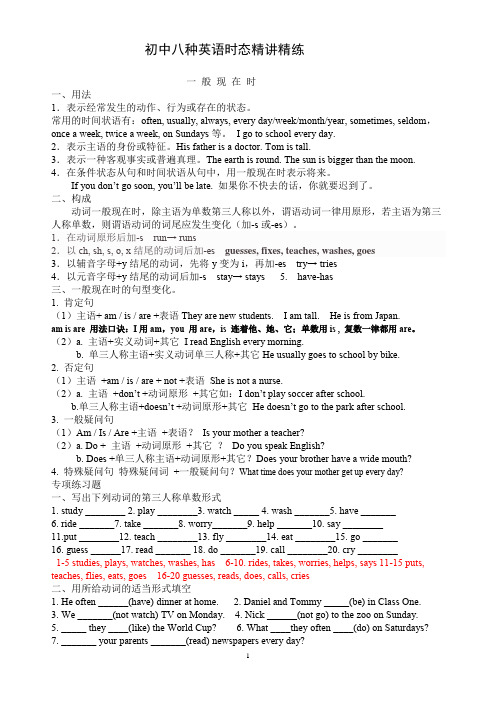
初中八种英语时态精讲精练一般现在时一、用法1.表示经常发生的动作、行为或存在的状态。
常用的时间状语有:often, usually, always, every day/week/month/year, sometimes, seldom,once a week, twice a week, on Sundays等。
I go to school every day.2.表示主语的身份或特征。
His father is a doctor. Tom is tall.3.表示一种客观事实或普遍真理。
The earth is round. The sun is bigger than the moon. 4.在条件状态从句和时间状语从句中,用一般现在时表示将来。
If you don’t go soon, you’ll be late. 如果你不快去的话,你就要迟到了。
二、构成动词一般现在时,除主语为单数第三人称以外,谓语动词一律用原形,若主语为第三人称单数,则谓语动词的词尾应发生变化(加-s或-es)。
1.在动词原形后加-s run→ runs2.以ch, sh, s, o, x结尾的动词后加-es guesses, fixes, teaches, washes, goes3.以辅音字母+y结尾的动词,先将y变为i,再加-es try→ tries4.以元音字母+y结尾的动词后加-s stay→ stays 5. have-has三、一般现在时的句型变化。
1. 肯定句(1)主语+ am / is / are +表语They are new students. I am tall. He is from Japan.am is are 用法口诀:I用am,you 用are,is 连着他、她、它;单数用is , 复数一律都用are。
(2)a. 主语+实义动词+其它I read English every morning.b. 单三人称主语+实义动词单三人称+其它He usually goes to school by bike.2. 否定句(1)主语+am / is / are + not +表语She is not a nurse.(2)a. 主语+don’t +动词原形+其它如:I don’t pla y soccer after school.b.单三人称主语+doesn’t +动词原形+其它He doesn’t go to the park after school.3. 一般疑问句(1)Am / Is / Are +主语+表语?Is your mother a teacher?(2)a. Do + 主语+动词原形+其它?Do you speak English?b. Does +单三人称主语+动词原形+其它?Does your brother have a wide mouth?4. 特殊疑问句特殊疑问词+一般疑问句?What time does your mother get up every day?专项练习题一、写出下列动词的第三人称单数形式1. study ________2. play ________3. watch _____4. wash _______5. have _______6. ride _______7. take _______8. worry_______9. help _______10. say ________11.put ________12. teach ________13. fly ________14. eat ________15. go _______16. guess ______17. read _______ 18. do _______19. call ________20. cry ________1-5 studies, plays, watches, washes, has 6-10. rides, takes, worries, helps, says 11-15 puts, teaches, flies, eats, goes 16-20 guesses, reads, does, calls, cries二、用所给动词的适当形式填空1. He often ______(have) dinner at home.2. Daniel and Tommy _____(be) in Class One.3. We _______(not watch) TV on Monday.4. Nick ______(not go) to the zoo on Sunday.5. _____ they ____(like) the World Cup?6. What ____they often ____(do) on Saturdays?7. _______ your parents _______(read) newspapers every day?8. The girl _______(teach) us English on Sundays.9. She and I ________(take) a walk together every evening.10. The moon ________ (travel) round the earth.11. It usually ________ (take) me more than two hours to finish my homework.12. I will tell him the good news as soon as he ________ (come) back.13. Miss Gao is very busy. She ________ (sleep) six hours a day.14. Look! Susan ________ (dance) in the garden. She often ________ (dance) there.15. The children will go to the Summer Palace if it ________ (not rain) tomorrow.16. I _________ any pears (not have). But Mary _________ some (have).17. What language ____ you _____? (speak) 18. My brother _____ to be a scientist. (not like) 19. We ______ Japanese at school. (not study) 20. He _____ playing football. (not like)1. has2. are3. don’t have4. doesn’t go5. Do like6. do, do7. Do, read8. teaches9. take 10. travels 11. takes 12. comes 13. sleeps 14. is dancing, dances 15. doesn’t rain 16. don’t have, has 17. do, speak 18. doesn’t like 19. don’t study 20. doesn’t like三、按照要求改写句子1. Daniel watches TV every evening.(改为否定句)_________________________2. I do my homework every day.(改为一般疑问句,并作肯、否定回答)________________________________________________________3. Amy likes playing computer games.(改为一般疑问句,并作肯、否定回答)___________________________________________________4. We go to school every morning.(改为否定句)____________________________5. Sun Yang usually washes some clothes on Saturday.否定句: _____________ 一般疑问句: ________________ 划线提问: ____________6. Tom does his homework at home.否定句: ______________ 一般疑问句: ____________ 划线提问_____________1. Daniel doesn’t watch TV every evening.2. Do you do your homework every day? Yes, I do. No, I don’t.3. Does Amy like playing computer games? Yes, she does. No, she doesn’t.4. We don’t go to school every morning.5. Sun Yang doesn’t usually wash any clothes on Saturday. Does Sun Yang usually wash any clothes on Saturday? What does Sun Yang usually do on Saturday?6. Tom doesn’t do his homework at home. Does Tom do his homework at home? Where does Tom do his homework?四、选用所给的词语适当形式填空give, rain, enjoy, sing, return, borrow, keep1. It often ______ in my hometown in summer.2. Sometimes the birds _______ in the tree.3. Joe usually ____ books from the school library, but she never _____ them on time.4. May I ________ the dictionary for a week?5. The little boy ________ himself in the garden on Saturdays.6. Mary is a good girl. She often ________ me a hand when I need some help.1. rains2. sing3. borrows, returns4. keep5. enjoys6. gives一般过去时的用法一、定义:表示过去某一时间所发生的动作或存在的状态;表示在过去一段时间内,经常性或习惯性的动作。
初中英语八大时态-详细语法解析-习题及答案

过去将来时1。
宾语从句或间接引语中eg He didn’t expect that we would all be there.2。
表示过去习惯性的动作eg During that period,he would do this every day.3.表示过去的愿望、倾向,多用于否定句eg They knew that we would never permit such a thing。
过去将来时基本结构过去将来时由would, was/were going to, was/were to was/were about to等加动词原形构成, 也可由was/were on the point of加动名词构成。
例句:I knew you would agree. 我知道你会同意的。
I said I would arrange everything. 我说我来安排一切。
八种时态详解:过去将来时表示过去的某时以后将要发生的动作。
但这个”将来”时间绝不会延伸到“现在”;而仅限于“过去时间区域内"。
由此可以看出,含这个时态的句子常带一个表示“过去某个时间点”的状语.这个状语或是一个短语,或是一个句子。
这个时态常用于:A)宾语从句或间接引语中;B)表示过去习惯性的动作;C)表示过去情况中的“愿望”、“倾向”,多用于否定句。
例如:A) When I thought about it , I wondered what their reaction would be . 当我考虑这件事时,我想知道他们的反应是什么。
She told me that she would go on trip to Europe the next day. 她告诉我,她第二天要去欧洲旅行。
He didn’t expect that we would all be there. 他没料到我们会全在那儿。
B) During that period , he would do morning-exercises every day. 在那段时间,他每天早锻炼。
中考英语-八大时态的基本时态练习(含答案)
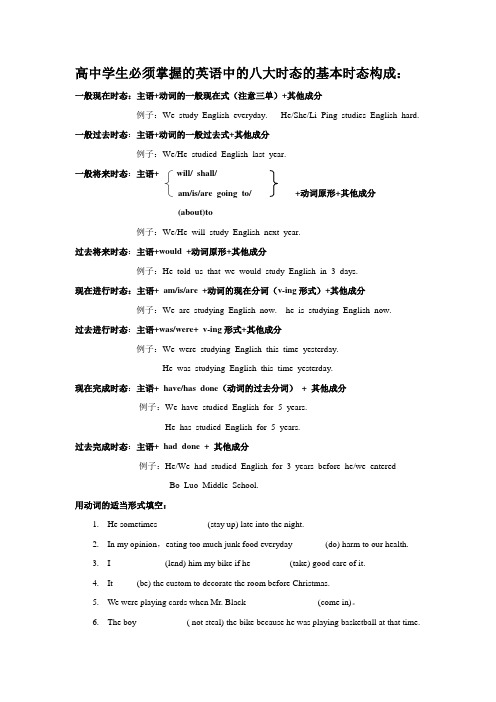
高中学生必须掌握的英语中的八大时态的基本时态构成:一般现在时态:主语+动词的一般现在式(注意三单)+其他成分例子:We study English everyday. He/She/Li Ping studies English hard. 一般过去时态:主语+动词的一般过去式+其他成分例子:We/He studied English last year.一般将来时态:主语+ will/ shall/am/is/are going to/ +动词原形+其他成分(about)to例子:We/He will study English next year.过去将来时态:主语+would +动词原形+其他成分例子:He told us that we would study English in 3 days.现在进行时态:主语+ am/is/are +动词的现在分词(v-ing形式)+其他成分例子:We are studying English now. he is studying English now.过去进行时态:主语+was/were+ v-ing形式+其他成分例子:We were studying English this time yesterday.He was studying English this time yesterday.现在完成时态:主语+ have/has done(动词的过去分词)+ 其他成分例子:We have studied English for 5 years.He has studied English for 5 years.过去完成时态:主语+ had done + 其他成分例子:He/We had studied English for 3 years before he/we enteredBo Luo Middle School.用动词的适当形式填空:1.He sometimes ___________(stay up) late into the night.2.In my opinion,eating too much junk food everyday _______(do) harm to our health.3.I ____________(lend) him my bike if he_________(take) good care of it.4.It _____(be) the custom to decorate the room before Christmas.5.We were playing cards when Mr. Black ________________(come in)。
初中英语八大时态用法详解及真题巩固练习

初中英语八大时态用法详解及真题巩固练习一般现在时1. 概念:经常、反复发生的动作或行为及现在的某种状况。
2. 基本结构:①is/am/are;②do/does否定形式:①am/is/are + not ; ②此时态的谓语动词若为行为动词,则在其前加don't,如主语为第三人称单数,则用doesn't,同时还原行为动词。
3. 一般疑问句:①把 is/am/are 动词放于句首;②用助动词do提问,如主语为第三人称单数,则用does,同时,还原行为动词。
4. 用法:1) 经常性或习惯性的动作,常与表示频度的时间状语连用。
例如:I leave home for school at 7 every morning. 每天早上我七点离开家。
2) 客观真理,客观存在,科学事实。
例如:The earth moves around the sun. 地球绕太阳转动。
Shanghai lies in the east of China. 上海位于中国东部。
3) 表示格言或警句。
例如:Pride goes before a fall. 骄者必败。
注意:此用法如果出现在宾语从句中,即使主句是过去时,从句谓语也要用一般现在时。
例如:I knew that the earth goes around the sun when I was little.我小时候就知道地球绕太阳转。
4) 现在时刻的状态、能力、性格、个性。
例如:I don't want so much. 我不要那么多。
Ann writes good English but does not speak well.安英语写得不错,讲的可不行。
5) 一般现在时表示将来含义a. 下列动词 come, go, arrive, leave, start, begin, return 的一般现在时可以表示将来,主要用来表示在时间上已确定或安排好的事情。
初中英语八大时态练习试题及答案(详解)
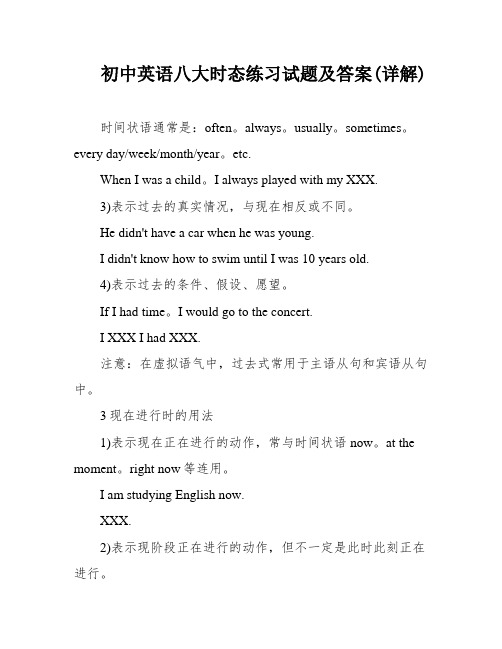
初中英语八大时态练习试题及答案(详解)时间状语通常是:often。
always。
usually。
sometimes。
every day/week/month/year。
etc.When I was a child。
I always played with my XXX.3)表示过去的真实情况,与现在相反或不同。
He didn't have a car when he was young.I didn't know how to swim until I was 10 years old.4)表示过去的条件、假设、愿望。
If I had time。
I would go to the concert.I XXX I had XXX.注意:在虚拟语气中,过去式常用于主语从句和宾语从句中。
3现在进行时的用法1)表示现在正在进行的动作,常与时间状语now。
at the moment。
right now等连用。
I am studying English now.XXX.2)表示现阶段正在进行的动作,但不一定是此时此刻正在进行。
He is learning Chinese this semester.XXX.注意:现在进行时表示的动作必须是正在进行的,而不是已经完成的或惯性的动作。
4过去进行时的用法1)表示过去某一时刻正在进行的动作。
I was watching TV when she called me.They were having dinner at 7 o'clock last night.2)表示过去某段时间内正在进行的动作。
I was XXX.He was working on the project for two weeks.注意:过去进行时强调的是动作的持续性和进行性,常与表示过去的时间状语连用。
5一般将来时的用法1)表示将来某一时刻要发生的动作或存在的状态。
I will go to the beach XXX.She will be 30 years old next month.2)表示将来经常性或惯性的动作。
初中英语8种时态分类练习及答案

初中英语8种时态分类练习1.一般过去2.一般现在。
现在进行4一般将来5过去进行6现在完成7过去完成8过去将来一般过去时专练( )1. The mother asked the boy _______ down the ladder, but he went on _______ instead.A. come; climbingB. to come; to climbC. to come; climbingD. coming; climbing( )2. The teacher asked the students to close the windows _______ the wind from _______ the papers away.A. to stop; blowingB. stopping; blowingC. to stop; blowD. stopped; blow( )3. The sick man stayed in bed, _______ very terrible.A. feltB. feelingC. is feelingD. was feeling( )4. Yesterday I heard a story _______ by my friend.A. toldB. tellingC. to tellD. tell( )5. The boy was made _______ there for an hour by his father.A. standingB. standC. to standD. stands( )6. I saw him _______ into the small store.A. wentB. goingC. to goD. has gone( )7. He raised his voice to make everybody in the room ______ him clearly.A. hearB. to hearC. hearingD. heard( )8. Our geography teacher told us yesterday that the earth _______ around the sun.A. was movingB. movedC. has movedD. moves( )9. Oh, it’s you. I’m sorry I _______ know you _______ here.A. don’t; areB. didn’t; areC. didn’t; wereD. don’t; were( )10. Mr LuXun died in 1936. He _______ a lot of famous novels.A. wroteB. was writingC. has writtenD. would write( )11. --- How was your weekend on the farm?--- Great! We _______ with the farmers.A. enjoy ourselvesB. went fishingC. will workD. make friends( )12. --- What did Mr Jones do before he moved here?--- He _______ a city bus for over twenty-five years.A. is drivingB. droveC. has drivenD. drives( )13. Jane _______ a new dress every month when she was in Shanghai.A. buysB. is buyingC. boughtD. will buy( )14. --- Liu Mei can’t come tonight.--- Why? But she _______ me she would come.A. tellsB. toldC. is toldD. had told( )15. He turned off the light and then _______.A. leavesB. has leftC. will leaveD. left一般现在时与现在进行时专练( ) 1. Father usually ______ his newspaper after dinner.A. readB. readsC. readingD. is reading( ) 2. The Blacks often ______ to the cinema on Saturday evenings.A. goB. goesC. is goingD. are going( ) 3.Look! The boy ______ with his mother in the pool.A. is swimmingB. is swimmingC. are swimmingD. are swiming( ) 4.--- What is Tom doing in the classroom? --- He ______ something on the blackboard.A. drawsB. drawC. is drawingD. are drawing.( ) 5.Old Tom usually ______ up at six and ______ sports in the garden.A. gets, dosB. gets, doesC. get, doesD. gets, do( ) 6. It’s ten o’clock and Jack ______ still(仍然) ______ his homework.A. is, doB. is, doingC. are, doD. are, doing( ) 7. The waiters ______ to work at five every morning.A. startB. startsC. startingD. are starting( ) 8.I ______ a letter, so I can’t go out with you.A. is writingB. am writingC. am writeingD. am writting( )9.A hundred days _____ quite a long time.A. isB. areC. haveD. has( )10. --______ late for the meeting next time. –Sorry, I won’t.A. Don’tB. Don’t beC. Won’t beD. Be not( )11. My mother _____ noodles, but my father ______.A. likes, doesn’tB. don’t like, doC. likes, didn’tD. didn’t like, do( )12. The picture ______ nice.A. looksB. is lookedC. lookD. is looking( )13. The students will go to the Summer Palace if it ______ tomorrow.A. don’t rainB. doesn’t rainC. won’t rainD. isn’t rain( )14. We are always ready _______ others.A. to helpingB. to helpC. helpD. helping( )15. I often hear her ______ about the boy.A. talkingB. talkC. to talkD. talked( )16. He’s already a little weak in Chinese, ______ he ?A. isB. isn’tC. hasD. hasn’t( )17.Potatoes are ______ in the field by the farmers.A. growB. growingC. grownD. grew( )18. Does she have a watch? – Yes, she ______.A. haveB. doC. hasD. does( )19. She _____ English very much now.A. is likingB. likesC. likedD. is teaching( )20. She has no paper to _____ . Why not give her some?A. writeB. be writingC. write onD. write in()21. Does Mr Know-all know ______ keys?A. to makeB. how to makeC. how makeD. making( )22. Does your mother ______ English now?A. teachesB. teachC. taughtD. is teaching( )23. Jack usually ______ mistakes last term. But this term he does better.A. makesB. madeC. doesD. did( )24. The boy is too young, please ______ carefully.A. look after himB. look him afterC. look at himD. look him at ( )25. She ______ you to come to my birthday party.A. hopesB. wishesC. wantD. lets( )26. --Where is Frank now? -- He ______ his bike in the yard.A. fixes upB. fixing upC. is fixing upD. fixed( )27. Bob often ______ his mother with the housework on Sundays.A. helpB. helpingC. helpsD. helped( )28. The students will go to the Summer Palace if it ______ tomorrow.A. don’t rainB. doesn’t rainC. won’t rainD. isn’t rain( )29. If it _____ tomorrow, I will go by car.A. rainB. will rainC. rainsD. would rain( )30. --What a nice garden! –She ______ it every day.A. is cleaningB. has cleanedC. cleansD. clean( )31. --Where is Peter? -- He ______ his homework in the room.A. is doingB. doesC. didD. do( )32. The teacher told us that light ______ much faster than sound.A. travelsB. traveledC. wasD. will be( )33. My mother told us that Taiwan ______ part of China.A. isB. areC. wasD. were( )34. Do you know bananas _____ in Hainan?A. growsB. is grownC. grewD. are grown( )35. The clothes ______very soft.A. are feltB. are feelingC. feelD. feels( )36. The supermarket is far from Mary’s house. So she _____ on ly once a week.A. goes shoppingB. has been thereC. was shoppingD. has gone there ( )37. Don’t make so much noise. We _____ to the music.A. are listeningB. listenC. listenedD. have listened( )38. I’ll go swimming with you if I _____ free tomorrow.A. will beB. shall beC. amD. was( )39. – Oh, Mrs. King, your sweater looks nice. Is it _____ wool ?-- Yes, and it’s _____ Inner Mongolia.A. made of, made byB. made of, made inC. made by, made forD. made by, made from3.一般将来时专练( )1. Her hope _______ the 2008 Olympic Games.A. to take part inB. is to take part inC. taking part inD. will take part in ( )2. --- Can I go to Beijing for my holiday, Dad? --- You can when you _______ a bit older.A. will getB. getC. are gettingD. got( )3. If he _______harder, he will catch up with us soon.A. studyB. studiesC. will studyD. studied( )4. --- Don’t forget to ask him to write to me.--- I won’t. As soon as he _______, I’ll ask him to write to you.A. will comeB. cameC. comesD. is coming( )5. --- Jimmy is leaving for a holiday.--- Really? Where _______ he _______?A. has; goneB. will; goC. did; goD. would; go( )6. Frank _______ to see his grandma if he _______ free tomorrow.A. will come; will beB. comes; isC. will come; isD. comes; will be( )7. There _______ a talk on science in our school next Monday.A. will giveB. will beC. is going to giveD. is( )8. --- Shall we go shopping now?--- Sorry, I can’t. I _______ my shirts.A. washB. washesC. washedD. am washing( )9. I believe that those mountains _______ with trees in a few years’ t ime.A. are coveredB. will be coveredC. are coveringD. will cover( )10. It is said that about 400 cars _______ in the factory next month.A. were producedB. will produceC. are producedD. will be produced( )11. --- Are you free this afternoon?--- No. I’ll have an English composition _______ this afternoon.A. to writeB. wroteC. to be writingD. to be written( )12. --- Come back home every month.--- I _______.A. willB. mustC. shouldD. can( )13. A robot _______ think of itself; it _______ be told what to do.A.can’t; mustB. couldn’t; canC. may not; willD. mustn’t, may4.过去进行时专练二、用动词的适当形式填空。
初中英语语法八大时态总结及练习题
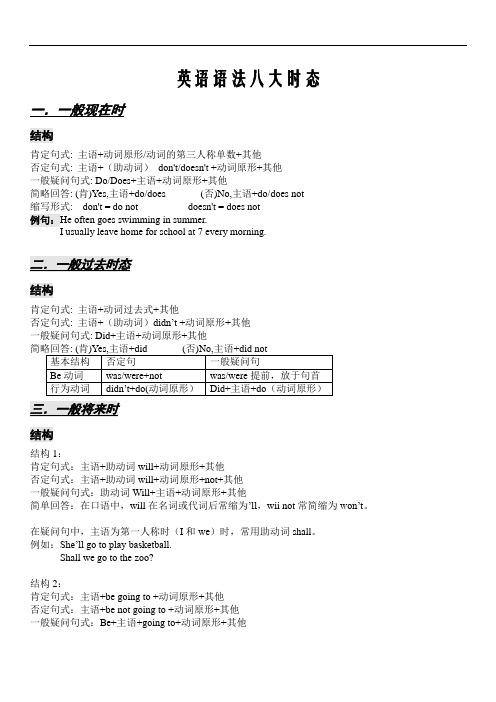
英语语法八大时态一.一般现在时结构肯定句式: 主语+动词原形/动词的第三人称单数+其他否定句式: 主语+(助动词)don't/doesn't +动词原形+其他一般疑问句式: Do/Does+主语+动词原形+其他简略回答: (肯)Yes,主语+do/does (否)No,主语+do/does not缩写形式: don't = do not doesn't = does not例句:He often goes swimming in summer.I usually leave home for school at 7 every morning.二.一般过去时态结构肯定句式: 主语+动词过去式+其他否定句式: 主语+(助动词)didn’t +动词原形+其他一般疑问句式: Did+主语+动词原形+其他基本结构否定句一般疑问句Be动词was/were+not was/were提前,放于句首行为动词didn’t+do(动词原形)Did+主语+do(动词原形)三.一般将来时结构结构1:肯定句式:主语+助动词will+动词原形+其他否定句式:主语+助动词will+动词原形+not+其他一般疑问句式:助动词Will+主语+动词原形+其他简单回答:在口语中,will在名词或代词后常缩为’ll,wii not常简缩为won’t。
在疑问句中,主语为第一人称时(I和we)时,常用助动词shall。
例如:She’ll go to play basketball.Shall we go to the zoo?结构2:肯定句式:主语+be going to +动词原形+其他否定句式:主语+be not going to +动词原形+其他一般疑问句式:Be+主语+going to+动词原形+其他简略回答:(肯)Yes,主语+be (否)No,主语+be not将来时其他表示法1)be going to表示将来表示说话人的打算、计划、安排或根据迹象判断必然或很可能发生的事情。
初中英语八大时态全套精讲及练习题(附答案)
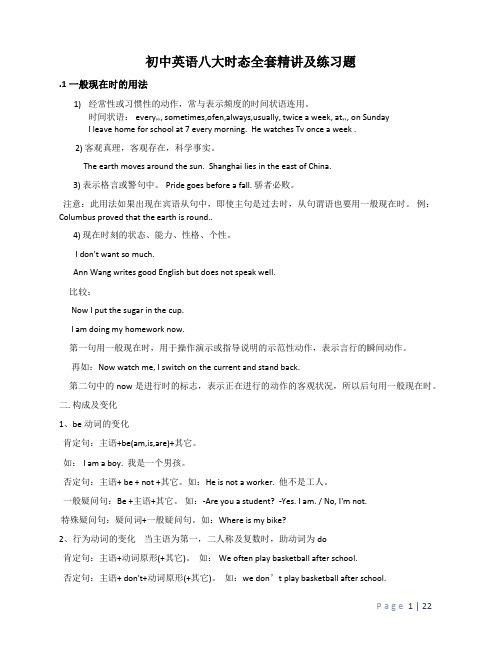
初中英语八大时态全套精讲及练习题.1 一般现在时的用法1)经常性或习惯性的动作,常与表示频度的时间状语连用。
时间状语: every…, sometimes,ofen,always,usually, twice a week, at…, on SundayI leave home for school at 7 every morning. He watches Tv once a week .2) 客观真理,客观存在,科学事实。
The earth moves around the sun. Shanghai lies in the east of China.3) 表示格言或警句中。
Pride goes before a fall. 骄者必败。
注意:此用法如果出现在宾语从句中,即使主句是过去时,从句谓语也要用一般现在时。
例:Columbus proved that the earth is round..4) 现在时刻的状态、能力、性格、个性。
I don't want so much.Ann Wang writes good English but does not speak well.比较:Now I put the sugar in the cup.I am doing my homework now.第一句用一般现在时,用于操作演示或指导说明的示范性动作,表示言行的瞬间动作。
再如:Now watch me, I switch on the current and stand back.第二句中的now是进行时的标志,表示正在进行的动作的客观状况,所以后句用一般现在时。
二. 构成及变化1、be动词的变化肯定句:主语+be(am,is,are)+其它。
如: I am a boy. 我是一个男孩。
否定句:主语+ be + not +其它。
如:He is not a worker. 他不是工人。
- 1、下载文档前请自行甄别文档内容的完整性,平台不提供额外的编辑、内容补充、找答案等附加服务。
- 2、"仅部分预览"的文档,不可在线预览部分如存在完整性等问题,可反馈申请退款(可完整预览的文档不适用该条件!)。
- 3、如文档侵犯您的权益,请联系客服反馈,我们会尽快为您处理(人工客服工作时间:9:00-18:30)。
初中英语八大时态一般现在时:1.表经常发生的事情、存在的动作或状态eg She sings with the band Crazy Boy.2.表内心活动感情等eg I don't think you are right.3.描述客观真理eg Birds fly in the sky.4.表预定的行为eg The train leaves at 9.一般过去时:1.表过去发生的事情或存在的状态eg Suddenly,the clouds cleared and the rain stopped.2.表过去经常发生的事情eg I was very thin in my childhood.3.带有确定的过去的时间状语eg Did you meet yesterday? He left just now.一般将来时:1.要在将来的某个时间内发生,是“纯粹的将来动作”。
eg I shall / will not be free tomorrow.2.表说话人的意图、打算或某种可能性eg Who is going to speak first?3.按计划要发生的动作或命令他人做某事eg The new bridge is to open to traffic in 3 days.现在进行时:1.说话、写文章的当刻正在发生的动作eg They are having a football match.2.现阶段一直在进行的动作eg He is preparing for CET Band Six.3.表示说话人的情感,如赞许、批评等eg She is often doing well at school.4.表示在近期按计划或安排要发生的动作eg Are you staying here till next week?过去进行时:1.表示在过去某时刻正在进行的动作eg At this moment yesterday, I was packing for camp.2.用于故事的开头,交代故事发生的背景情况eg One night, he was typing in his study . Suddenly , a man broke …3.表示在过去的未来时间要发生的动作eg We left there when it's getting dark.过去完成时:1.发生在“过去的过去”eg When I woke up, it had stopped raining.2.与一个表示过去的时间状语连用eg Peter had collected more than 300 Chinese stamps by the time he was ten.3.在过去某时之前开始一直延续到这一时间eg By the end of last year, he had worked in the factory for twenty years.现在完成时:1.表示截止现在业已完成的动作eg By now, I have collected all the data that I need.2.表示发生在过去而对现在产生影响、带来结果的动作eg She has been to the United States.3.表示过去发生的动作持续到现在,并可能还要延续eg I have learned English for 8 years.过去将来时:1.宾语从句或间接引语中eg He didn't expect that we would all be there.2.表示过去习惯性的动作eg During that period, he would do this every day.3.表示过去的愿望、倾向,多用于否定句eg They knew that we would never permit such a thing.初中英语动词时态专项训练一、用所给词的适当形式填空:1 He swimming in the river every day in summer. (go)2.It you are right. ( seem )3.Look, the children basketball on the playground. ( play )4.He to the radio when I came in, ( listen )5.It is very cold .I think it . ( rain )6. —I need some paper . —I some for you . ( bring )7.I can’t find my pen . Who it ? ( take )8.He said that he back in five minutes . ( come )9.I didn’t meet him. He when I got there. ( leave )10.I my bike, so I have to walk to school. ( lose )11.He down and began to read his newspaper. ( sit )12.He is not here. He to the post office. (go)13.He is very hungry. He anything for three days. ( not eat )14.I with you if I have time . ( go )15.We will go to the cinema if it tomorrow . (rain )16.I will tell her the news when she to see me next week. (come)17. “ When you the car ?” “ In 1998 . ”( buy )18.We good friends since we met at school . (be)19.What you at five yesterday afternoon ? (do)20.The bike is nice . How much it ? (cost)二、选择最佳答案填空()1.We’ll go swimming if the weather fine tomorrow.A. isB. wasC. will beD. is going to be()2.It five years since he has left for Beijing.A. wasB. have beenC. isD. is going to be ()3.Please don’t leave the office until your friend back.A. cameB. comesC. have comeD. will come ()4.By the end of last year he about 1500 English words.A. learnsB. learnedC. was learningD. had learned ()5.Listen ! Someone in the next room .A. criedB. cryingC. is cryingD. has cried()6.You must tell him the news as soon as you him.A. seeB. seesC. will seeD. is seeing()7.He told me that he to see us the next day.A. comesB. cameC. will comeD. would come()8.We can’t find him anywhere . Perhaps he home.A. is goingB. wentC. has comeD. would come()9.The teacher told us that the sun bigger than the earth.A. isB. wasC. has beenD. will be()10.Could you tell me where the railway station ?A. wasB. isC. will beD. would be()11.We to the Great Wall several times.A. goB. were goingC. have goneD. have been()12.It seemed that the old man for something over there.A. looksB. lookedC. was lookingD. has looked()13.He was sure that he his wallet in the office .A. leftB. would leaveC. had leftD. has left()14.You must study hard if you want to fail the exam.A. won’tB. don’tC. haven’tD. hadn’t()15. —I’m afraid you can’t sit here . —Sorry , I know.A. don’tB. won’tC. can’tD. didn’t()16. As she the newspaper , Granny asleep.A. read , was fallingB. fellC. was reading , was fallingD. read , fell()17. —my glasses ? —Yes , I saw them on your bed a minute ago.A. Do you seeB. Had you seenC. Would you seeD. Have you seen ()18. —Jim is not coming tonight . —But he !A. promises(许诺)B. promisedC. will promiseD. had promised()19. —What’s her name? —I .A. forgetB. forgotC. had forgottenD. am forgetting()20.You your turn so you’l l have to wait.A. will missB. have missedC. are missingD. had missed三、动词时态能力综合测试()1.He often his clothes on Sundays.A. washingB. washesC. has washedD. wash()2.I’m Chinese. Where from?A. do you comeB. you are comingC. you comeD. are you coming ()3.May to school.A. never walksB. is never walkingC. walk neverD. never is walking()4.We will start as soon as our teacher .A. comesB. will comeC. comeD. is coming()5.How long ago playing football?A. have you stoppedB. had you stoppedC. did you stopD. do you stop()6.It hard when I left my house .A. is rainingB. rainsC. was rainingD. will rain()7.I think this question to answer.A. easyB. is easyC. was easyD. will easy()8. Don’t talk so loudly . Your fatherA. sleepsB. is sleepingC. sleptD. had slept()9.How many people does the doctor know who of the disease (疾病)?A. are dyingB. is dyingC. has diedD. dies()10.I my homework now.A. finishB. finishedC. have finishedD. had finished()11.It ten years since his father died.A. isB. wasC. had beenD. will be()12.He for three years.A. has joinedB. has been in the armyC. joinedD. has served the army()13.His grandfather for thirty years.A. diedB. was deadC. has been deadD. has died()14.I from my brother for a long time.A. not have heardB. have not heardC. have heard notD. do not hear()15.Maths , one of the most important subjects always interested him.A. hasB. haveC. areD. is()16.—Did your brother go to America last year? —A. No , he did never go thereB. No , he has never gone hereC. No , he never was thereD. No , he’s never been there ()17.He that factory since 1958.A. has leftB. has worked inC. has gone fromD. has come to ()18.Since ten years ago great changes in China.A. happenedB. have been happenedC. have happenedD. are taken place()19.Our teacher to Beijing three times.A. wentB. had goneC. has goneD. has been()20.It’s the third time you late this week.A. had arrivedB. arrivedC. have arrivedD. arrive()21. the film since I came here.A. I’ve seenB. I will seeC. I would seeD. I see()st week John his leg.A. felt and brokenB. fell and brokeC. feels and breaksD. fallen and broken()23.Jack his thick coat because it was snowing.A. puts onB. put onC. takes onD. took on()24.He the picture on the wall.A. hangedB. hungC. has hangedD. was hanged ()25.Next month twenty five.A. has my sisterB. my sister will beC. my sister shall haveD. my sister is going to be()26.You her again in a few weeks.A. will seeB. have seenC. had seenD. have been seen ()27.My parents me to be a doctor.A. hopedB. wantedC. decidedD. withes()28.It hard when we left.A. is rainingB. has rainedC. rainedD. was raining ()29. By the end of last term we English for two years.A. have studiedB. have been studiedC. would studiedD. had studied()30.She said that she there for five years .A. has workedB. had workedC. was workingD. worked()31.Mrs Brown in New York for three years before she went to London.A. livedB. had livedC. has livedD. will live()32.When we arrived , the dinner .A. already beganB. has already begunC. had already begunD. was just begun()33.I will go home for the holiday as soon as I my exams.A. will finishB. finishC. finishingD. finished()34.When , I’ll talk to him.A. does Peter comeB. Peter will comeC. Peter comesD. can Peter come()35.My sister to see me . She’ll be here soon.A. comesB. is comingC. had comeD. came()36.They said they our answer the next day .A. had heardB. would hear ofC. would hearD. will hear ()37.The old man said that light faster than sound.A. wentB. will goC. travelsD. will travel()38.Oh, dear Xiao Hong . I you in Nanjing.A. don’t know , areB. didn’t know , wereC. didn’t know , areD. don’t know , have been()39.—Is John going away?— I think so . He for a better job, but he didn’t get it.A. had hopedB. was hopedC. hopingD. had hope()40.I am sure he’ll come to see me before he Beijing.A. leaveB. leftC. will leaveD. leaves()41.—Well , here I am at last. —Good ! I worried .A. was ,that you wouldn’t be back on timeB. is , that you would be back on timeC. is , so you’d be back on timeD. was , whether(是否) you wouldn’t be back on time参考答案一、1.goes 2. seems 3. are playing 4. was listening 5.is going to rain 6. will bring 7. has taken 8.would come 9. had left 10. have lost 11. sat 12. has gone 13. hasn’t eaten 14.will go 15. rains es 17. did , buy 18. have been 19. were , doing 20. did , cost二、1——5ACBDC 6——10ADCAB 11——15DCCBD 16——20BDBAB三、1——5BAAAC 6——10CBBAC 11——15ABCBA 16——20DBCDC 21——25ABBBB 26——30ABDDB 31——35BCBCB 36——40CCBAD 41.A。
